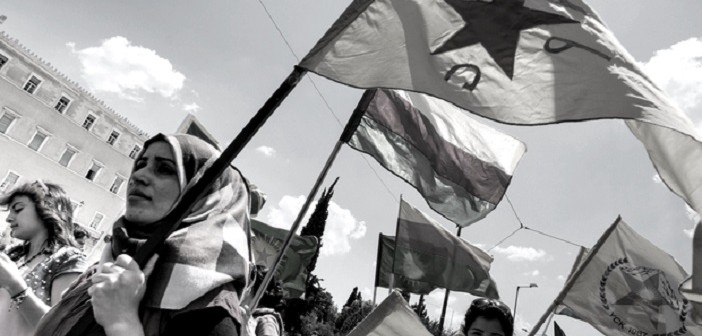The situation in Syria has become increasingly complicated with numerous rapid changes recently, including the recent ceasefire and the negotiations held at Geneva III, which marginalized particular groups inside Syria. The ceasefire was unstable involving ongoing sporadic clashes, while the war continued between the Syrian Democratic Forces (SDF), consisting mostly of Kurds, and ISIS in the northern parts of Syria.
In the last year the Kurds have come to control a large swathe of land in the northern parts of Syria where they have also opened the corridor between the Kobane and Cezire canton, andare now looking to expand their region especially by opening the road to Efrin which requires controlling the land space between Kobane and Efrin (called the Shahba region, which includes Azaz, Jerabulus, Menbej, al-Bab, Mara).
This region is a highly strategic and politicised space because of Turkish threats that this zone is a “red line” for Turkey’s tolerance of Kurdish expansion. This is largely because Turkey views the forces in this region as being a continuation of the PKK movement, which is currently on the international terror list.
The leader of the Syrian Democratic forces, Devrem Kobane, recently stated that “the coalition forces, with whom we are currently in coordination, did not allow us to liberate more than 4km around the Tishreen Dam because of the sensitive political situation.” Devrem further mentioned that the new operation will focus on liberating Jerabulus soon: “Given the change in the political situation, this operation will commence soon due to the changing situation on the ground, as discussions continue with the coalition forces about providing us with the necessary armoured vehicles, due to the fact that the increased land control requires further capacity to control and monitor the liberated regions.”
It is still possible for the Kurds, following Turkey’s silence regarding Kurdish participation in Geneva, to partake in the discussions especially following Russia retreating part of its forces from Syria and the news that the high American Delegation visiting the Kurdish region, specifically Efrin for the first time, to the emergency meeting in Ankara to create a new military leadership consisting of all the opposition groups to the possibility of Hezbollah leaving Syria, indicating that all of these recent political changes point towards the path of Syria finding a solution supporting the end of the war and its fallout around the world, particularly following the refugee crises, which has made the Syrian issue a serious concern and source of discussion within the Western nations.
The Russian foreign affairs ministry noted that the idea of federalism is the best solution to address Syria’s ongoing political issues; through a federal system, which does not divide the county but addresses its problems, a solution which also receives unofficial support from the American and European political leadership
It appears that we are faced with three potential federal regions (coast, north, and the central and eastern regions), and the imminent beginning of the political battle about the shape of this new federal system and more importantly about how much autonomy and power the national and regional levels of this new system will receive.



